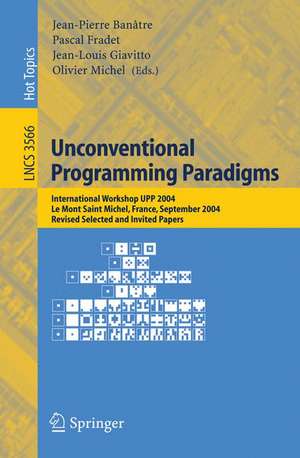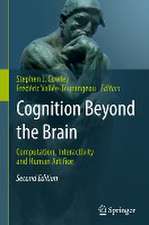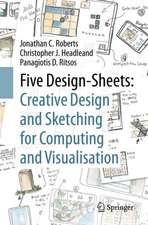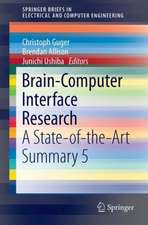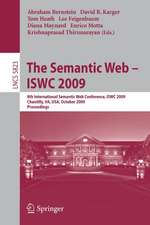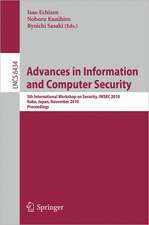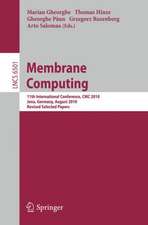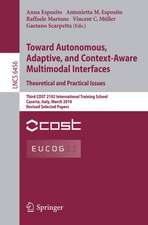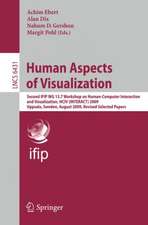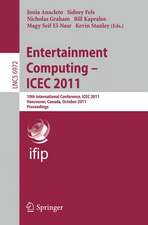Unconventional Programming Paradigms: International Workshop UPP 2004, Le Mont Saint Michel, France, September 15-17, 2004, Revised Selected and Invited Papers: Lecture Notes in Computer Science, cartea 3566
Editat de Jean-Pierre Banâtre, Pascal Fradet, Jean-Louis Giavitto, Olivier Michelen Limba Engleză Paperback – 15 iul 2005
Din seria Lecture Notes in Computer Science
- 20%
 Preț: 1061.55 lei
Preț: 1061.55 lei - 20%
 Preț: 307.71 lei
Preț: 307.71 lei - 20%
 Preț: 438.69 lei
Preț: 438.69 lei - 20%
 Preț: 645.28 lei
Preț: 645.28 lei -
 Preț: 410.88 lei
Preț: 410.88 lei - 15%
 Preț: 580.46 lei
Preț: 580.46 lei - 17%
 Preț: 427.22 lei
Preț: 427.22 lei - 20%
 Preț: 596.46 lei
Preț: 596.46 lei -
 Preț: 449.57 lei
Preț: 449.57 lei - 20%
 Preț: 353.50 lei
Preț: 353.50 lei - 20%
 Preț: 1414.79 lei
Preț: 1414.79 lei - 20%
 Preț: 309.90 lei
Preț: 309.90 lei - 20%
 Preț: 583.40 lei
Preț: 583.40 lei - 20%
 Preț: 1075.26 lei
Preț: 1075.26 lei - 20%
 Preț: 310.26 lei
Preț: 310.26 lei - 20%
 Preț: 655.02 lei
Preț: 655.02 lei - 20%
 Preț: 580.93 lei
Preț: 580.93 lei - 20%
 Preț: 340.32 lei
Preț: 340.32 lei - 18%
 Preț: 938.83 lei
Preț: 938.83 lei - 20%
 Preț: 591.51 lei
Preț: 591.51 lei - 15%
 Preț: 438.59 lei
Preț: 438.59 lei - 20%
 Preț: 337.00 lei
Preț: 337.00 lei -
 Preț: 389.48 lei
Preț: 389.48 lei - 20%
 Preț: 607.39 lei
Preț: 607.39 lei - 20%
 Preț: 1024.44 lei
Preț: 1024.44 lei - 20%
 Preț: 579.30 lei
Preț: 579.30 lei - 20%
 Preț: 763.23 lei
Preț: 763.23 lei - 20%
 Preț: 453.32 lei
Preț: 453.32 lei - 20%
 Preț: 575.48 lei
Preț: 575.48 lei - 20%
 Preț: 585.88 lei
Preț: 585.88 lei - 20%
 Preț: 825.93 lei
Preț: 825.93 lei - 20%
 Preț: 763.23 lei
Preț: 763.23 lei - 17%
 Preț: 360.19 lei
Preț: 360.19 lei - 20%
 Preț: 1183.14 lei
Preț: 1183.14 lei - 20%
 Preț: 340.32 lei
Preț: 340.32 lei - 20%
 Preț: 504.57 lei
Preț: 504.57 lei - 20%
 Preț: 369.12 lei
Preț: 369.12 lei - 20%
 Preț: 583.40 lei
Preț: 583.40 lei - 20%
 Preț: 343.62 lei
Preț: 343.62 lei - 20%
 Preț: 350.21 lei
Preț: 350.21 lei - 20%
 Preț: 764.89 lei
Preț: 764.89 lei - 20%
 Preț: 583.40 lei
Preț: 583.40 lei - 20%
 Preț: 649.49 lei
Preț: 649.49 lei - 20%
 Preț: 341.95 lei
Preț: 341.95 lei - 20%
 Preț: 238.01 lei
Preț: 238.01 lei - 20%
 Preț: 538.29 lei
Preț: 538.29 lei
Preț: 336.67 lei
Preț vechi: 420.84 lei
-20% Nou
Puncte Express: 505
Preț estimativ în valută:
64.42€ • 67.44$ • 53.30£
64.42€ • 67.44$ • 53.30£
Carte tipărită la comandă
Livrare economică 05-19 aprilie
Preluare comenzi: 021 569.72.76
Specificații
ISBN-13: 9783540278849
ISBN-10: 3540278842
Pagini: 384
Ilustrații: XI, 367 p.
Dimensiuni: 155 x 235 x 20 mm
Greutate: 0.54 kg
Ediția:2005
Editura: Springer Berlin, Heidelberg
Colecția Springer
Seriile Lecture Notes in Computer Science, Theoretical Computer Science and General Issues
Locul publicării:Berlin, Heidelberg, Germany
ISBN-10: 3540278842
Pagini: 384
Ilustrații: XI, 367 p.
Dimensiuni: 155 x 235 x 20 mm
Greutate: 0.54 kg
Ediția:2005
Editura: Springer Berlin, Heidelberg
Colecția Springer
Seriile Lecture Notes in Computer Science, Theoretical Computer Science and General Issues
Locul publicării:Berlin, Heidelberg, Germany
Public țintă
ResearchCuprins
Invited Talk.- From Quantum Physics to Programming Languages: A Process Algebraic Approach.- Chemical Computing.- Chemical Computing.- Programming Reaction-Diffusion Processors.- From Prescriptive Programming of Solid-State Devices to Orchestrated Self-organisation of Informed Matter.- Relational Growth Grammars – A Graph Rewriting Approach to Dynamical Systems with a Dynamical Structure.- A New Programming Paradigm Inspired by Artificial Chemistries.- Higher-Order Chemical Programming Style.- Amorphous Computing.- to Amorphous Computing.- Abstractions for Directing Self-organising Patterns.- Programming an Amorphous Computational Medium.- Computations in Space and Space in Computations.- Bio-inspired Computing.- Bio-inspired Computing Paradigms (Natural Computing).- Inverse Design of Cellular Automata by Genetic Algorithms: An Unconventional Programming Paradigm.- Design, Simulation, and Experimental Demonstration of Self-assembled DNA Nanostructures and Motors.- Membrane Systems: A Quick Introduction.- Cellular Meta-programming over Membranes.- Modelling Dynamically Organised Colonies of Bio-entities.- P Systems: Some Recent Results and Research Problems.- Outlining an Unconventional, Adaptive, and Particle-Based Reconfigurable Computer Architecture.- Autonomic Computing.- Autonomic Computing: An Overview.- Enabling Autonomic Grid Applications: Dynamic Composition, Coordination and Interaction.- Grassroots Approach to Self-management in Large-Scale Distributed Systems.- Autonomic Runtime System for Large Scale Parallel and Distributed Applications.- Generative Programming.- Towards Generative Programming.- Overview of Generative Software Development.- A Comparison of Program Generation with Aspect-Oriented Programming.- Generative Programming from a PostObject-Oriented Programming Viewpoint.
